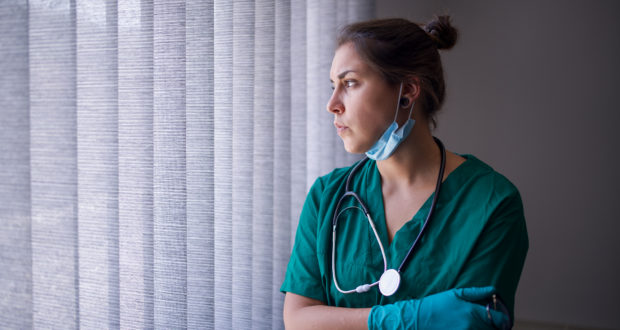The pandemic has impacted many of us around the world, especially the frontline healthcare workers, myself included, as a pain physician in Melbourne. Politicians talk about revitalisation post-COVID-19 but they fail to talk about the emotional pain that the frontline health care workers have been through during the pandemic.
Caring for colleagues who were ill, offering comfort to dying patients who were isolated from their loved ones, and informing and consoling patients’ family members remotely. Some frontline health care workers were burdened with emotionally and ethically fraught decisions about resource rationing and withholding resuscitation or ICU admission. They shared the pain of patients without COVID-19 who had their surgery or other essential treatments cancelled or postponed.
The fear of transmitting COVID-19 led many health professionals to isolate themselves from their families for months; working remotely and being shunned by community members further contributed to their loneliness.
Words cannot describe the extent of their emotional pain.
The stress on doctors and nurses pre-COVID was already apparent. They are known to be at risk of anxiety, depression, burnout, insomnia, moral distress and post-traumatic stress disorder. Under usual working conditions, severe burnout syndrome affects as many as 33 per cent of critical care nurses and up to 45 per cent of critical care physicians.
An already strained healthcare system
COVID-19 has certainly worsened the dilemma of severe burnout in the frontline health care workers, and unfortunately, many are still fighting the war of the pandemic at the time I’m writing this.
Strained and poorly resourced health systems certainly added to the dilemma of severe burnout in these health care workers.
Severe burnout can certainly cause physical, emotional, spiritual and mental pain in these frontline health care workers. As a consequence, some health care workers end up self-medicating with alcohol and drugs, which is detrimental to their health in the long term.
Their relationships are impaired, marriages break down. In the worst cases, suicides arise. This has to be addressed as these stoic workers naturally do not complain or seek assistance for these burnout problems. They suffer in silence.
The voices of the exhausted nurses
I had conversations with my nursing colleagues who are currently working in the frontline in Victoria. In Victoria, nurses who have never been in intensive care or on COVID wards are now working 10-hour shifts in acute care, being trained as they work and high infection numbers are filling them with terror as they look around at their dwindling resources.
One nurse spoke about the heartbreaking conversations she was having with her unvaccinated patients as she gently untied the knots of information they had anxiously wound around themselves. Her patients wanted the vaccine now, and they asked for it with struggling breath. Some nurses even had anger projected at them by distressed patients whose elective surgery was cancelled and even some emergency surgery were moved offsite to private and other medical settings.
The unspoken pandemic in frontline healthcare workers recognised
Our freedoms out of lockdown are being borne on the shoulders of healthcare workers who end their days with cuts on their faces from their PPE and who hadn’t had a break in months. If we are going to ask our healthcare workers to do the work, I think we should say their name.
Suffering something similar in my career, I know the detrimental impact of not having a voice or being heard in the medical community. Medical professionals alongside their nursing colleagues do not want to appear weak, so they continue until something breaks.
I understand where the frontline health care workers are coming from. Please remember that you are not alone.
Dr Olivia Ong, author of The Heart-Centeredness of Medicine, is a resilience leadership consultant, life and business coach for doctors, and established pain physician.
Do you have an idea for a story?Email [email protected]
 Aged Care Insite Australia's number one aged care news source
Aged Care Insite Australia's number one aged care news source

